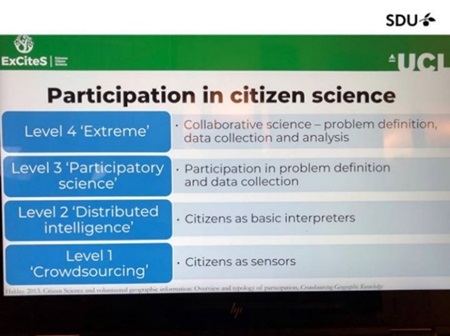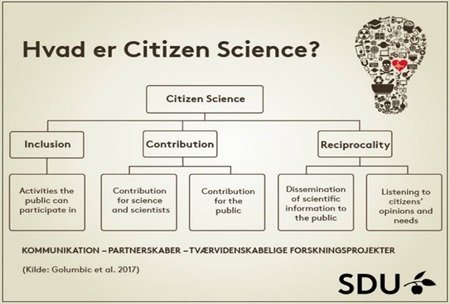There are various definitions of Citizen Science which change according to various fields of study and their traditions: (link: https://www.sdu.dk/da/forskning/forskningsformidling/citizenscience/hvad-er-cs).
Two models
The Knowledge Centre has been using two models in recent years, which can each be used in its own way, if you want to consider whether Citizen Science will be a good fit for your research area.
Muki Haklay, professor and founder of the centre ‘Extreme Citizen Science’ at University College London defines four levels of participation:

This model will give you a good checklist for points where citizens can contribute. None of the levels is ”more correct” or ”better” than any other. The model also makes it possible to demonstrate that Citizen Science projects can be initiated by citizens or be carried out in equal collaboration.
Yaela Gulumbic et al. also did a review of research projects and researchers’ experiences of what Citizen Science can contribute.

The advantage of this model is that as a researcher, you can identify and classify activities in your project or idea. The model also stresses reciprocity (mutuality and dialogue) as an integrated element in Citizen Science.
Statements from SDU researchers
If you would like to know more about the motivations and experiences of other SDU researchers in working with Citizen Science:
|
Name |
Anna Paldam Folker |
|
Position, unit/faculty |
Head of Research, Associate Professor, National Institute of Public Health, SDU Head of Human Health, SDU |
|
My experience with CS |
In an ongoing Human Health project we experiment with CS through collaboration with TVSyd and through direct involvement of citizens in the design and data collection process |
|
What is the potential for CS? |
Better legitimacy and relevance; Attunement of needs and language; Societal impact |
|
Do you see possibilities for further projects? |
Definitely. Currently, I integrate CS in two research applications (Novo Nordisk Fonden 27/1 21 and TrygFonden 1/3 21). But more to come. |
|
Name |
Sara Egemose |
|
Position, unit/faculty |
Associate Professor, Department of Biology, Faculty of Science |
|
My experience with CS |
I have worked with Citizen Science since 2007 in different project. I have cooperated with fishermen’s, made Citizen Science projects about climate adaptation in cooperation with utility companies and high school and latest the Citizen Science project “Find a lake” in cooperation with citizens, primary schools, high schools, libraries and institutions |
|
What is the potential for CS? |
It has a great potential in many research disciplines. Its important to engage citizens in research and use also as a communication channel both from researcher to citizen and from citizen to researcher. |
|
Do you see possibilities for further projects? |
Yes, definitely. I already have more project ideas in mind and several of them are already included in upcoming applications for funding. |